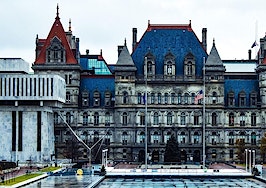As the country mourns and gears up for what is likely to be a bitter political fight, U.S Supreme Court Justice Ruth Bader Ginsburg, who died on Friday, is being remembered as a champion for civil rights, including fair housing. Ginsburg, the second woman to serve on the nation’s highest court, died from pancreatic cancer at age 87.
On Monday, the mayors of Minnesota’s Twin Cities, Minneapolis and St. Paul, declared Sept. 21, “Ruth Bader Ginsburg Day” in recognition of Ginsburg’s record as a champion for gender equality, racial justice, fair elections and fair housing. In regards to the latter, the mayors cited her “decisive fifth vote to uphold the Fair Housing Act, a monumental victory for our Twin Cities in the continued struggle to realize housing as a human right.”
In 2015, Ginsburg joined in the 5-4 majority in Texas Department of Housing & Community Affairs v. The Inclusive Communities Project, Inc., a ruling that upheld the Fair Housing Act’s “disparate impact” standard which is meant to prevent discrimination against protected classes under facially neutral policies — i.e. policies that don’t seem discriminatory on their face — regardless of intent. Earlier this month, the Trump administration weakened the standard, a move that was criticized by public interest groups, including the National Fair Housing Alliance, and the National Association of Realtors.
In a statement, the National Fair Housing Alliance President and CEO Lisa Rice said that Ginsburg “voted numerous times on the bench to advance fair housing” and specifically cited the disparate impact decision.
“This ruling affirmed the use of disparate impact as a tool to help make housing more accessible for families with children, women, LGBTQ people, people with disabilities, people of faith, and communities of color, and it has played a critical role in advancing civil rights and equal opportunity and addressing the segregation that still persists in America,” Rice said.
“The Trump administration has since waged an all-out attack on this vital tool, a move that undermines the progress made by Ginsburg and others who dedicated their lives to achieving equality.”
In an email to Inman, the NFHA also cited Ginsburg’s 5-3 majority vote in Bank of America Corp. v. City of Miami, a ruling that allowed the city of Miami to bring a lawsuit under the Fair Housing Act alleging that Bank of America and Wells Fargo violated the law when they issued riskier and more expensive mortgages to borrowers of color than they had offered to white borrowers, resulting in a disproportionate number of foreclosures and vacancies in majority-minority neighborhoods, thereby reducing the city’s property-tax revenue while increasing its costs.
In an emailed statement, NAR President Vince Malta told Inman, “Like the rest of the nation, NAR mourns the loss of Supreme Court Justice Ruth Bader Ginsburg after a valiant battle with pancreatic cancer. We appreciate hers and all federal efforts to strengthen fair housing protections in America, a fight which has taken on increased importance in light of the events of 2020. Our thoughts remain with Justice Bader Ginsburg’s family and all of her love ones as the nation celebrates her incredible life and grieves her passing.”
In her remarks, NFHA’s Rice made sure to highlight Ginsburg’s last ask: “NPR reported that in her final days, Ginsburg told her granddaughter Clara Spera the following: ‘My most fervent wish is that I will not be replaced until a new president is installed.’ We must honor her life by honoring her final wish and allow the U.S. system of democracy to take hold, ensuring that no nominee is put forward at this time.”
Editor’s note: This story has been updated with a comment from NAR.
Email Andrea V. Brambila.
Like me on Facebook | Follow me on Twitter






